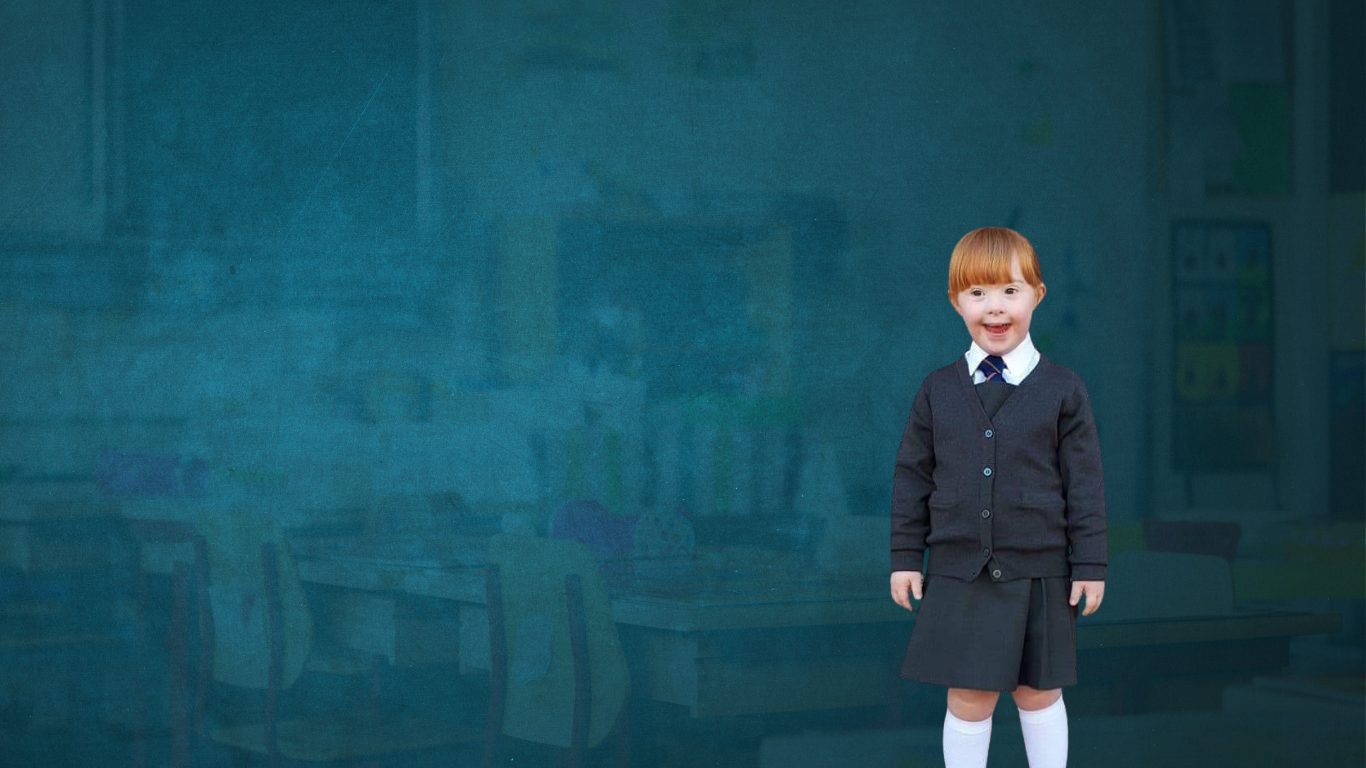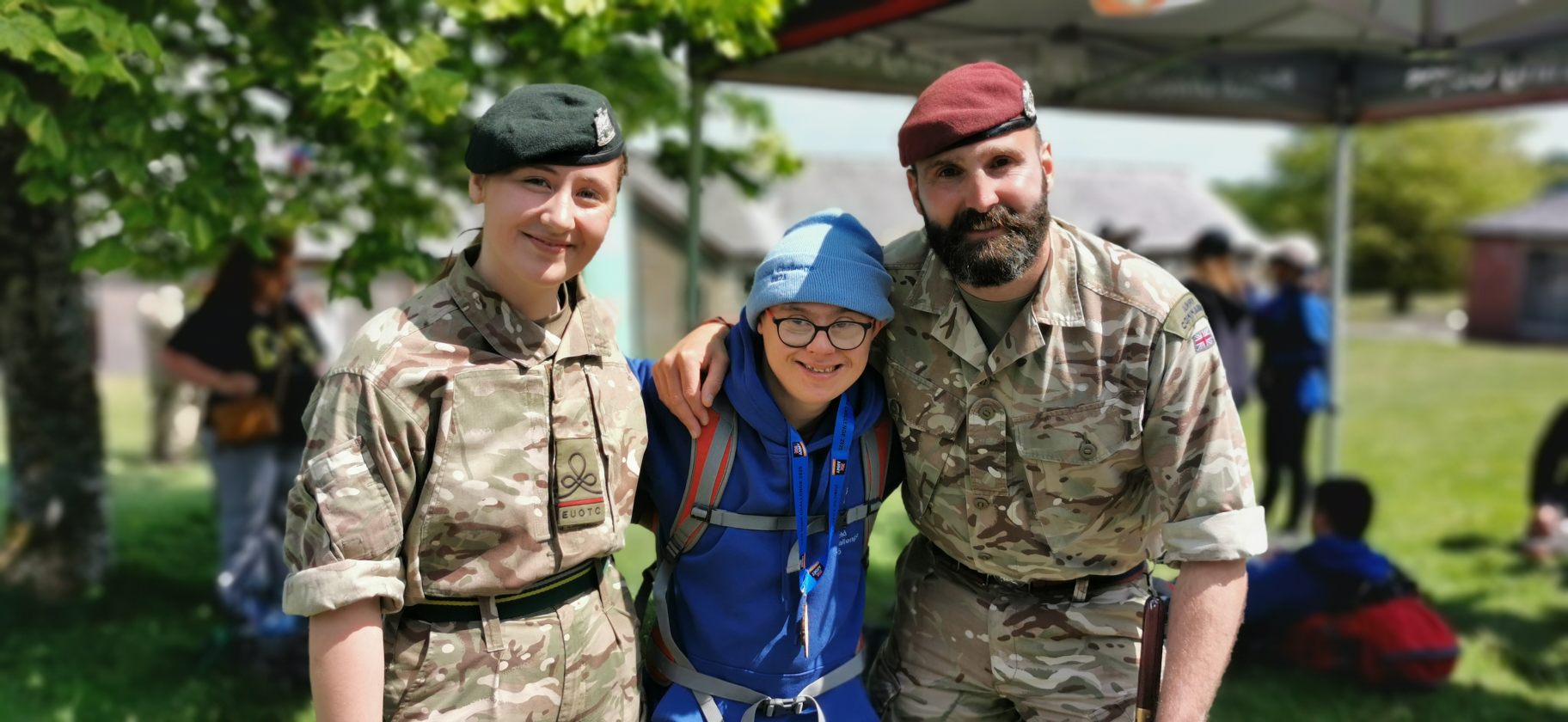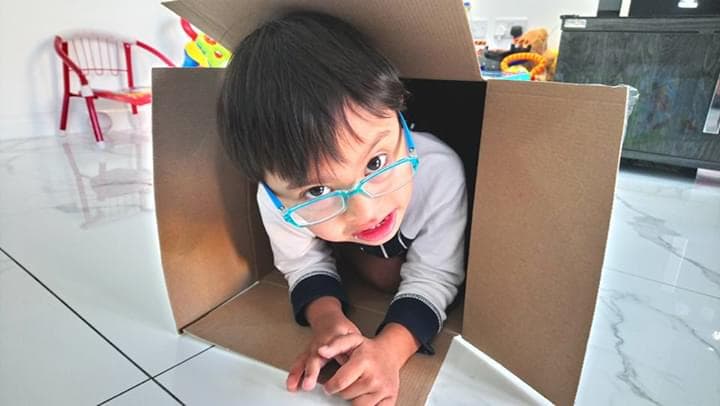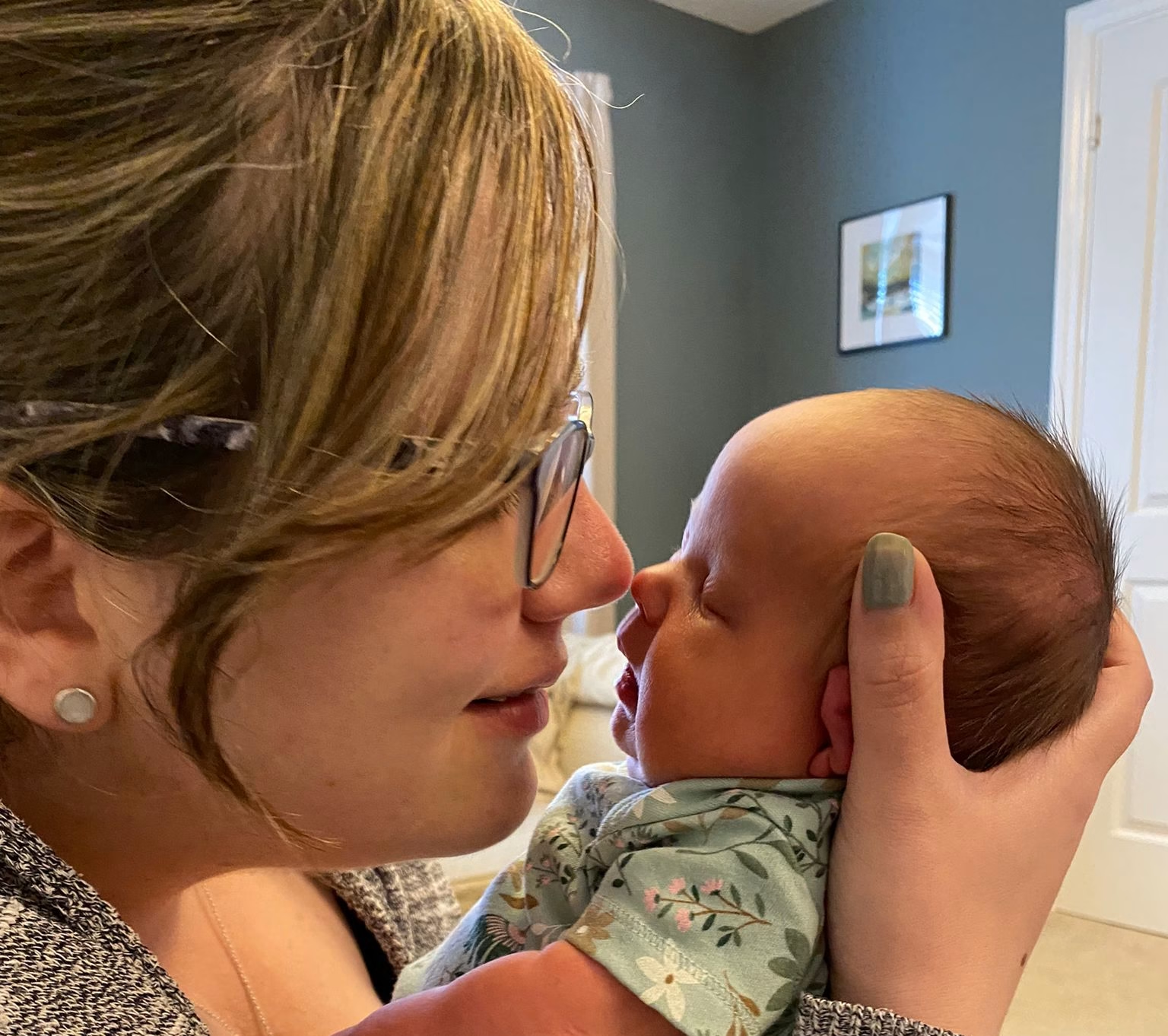- by Dr Rebecca Baxter
Just discovered you’ll be teaching a child with Down syndrome? This introductory guide covers everything you need to know to create an inclusive, supportive classroom environment where every child can thrive.
Finding out you’ll be teaching a child with Down syndrome can bring up many questions and perhaps some anxiety. Will you know how to meet their needs? What should you expect? How can you ensure they feel welcomed and supported in your classroom?
Take a deep breath. If you’re asking these questions, you’re already on the right track. This guide will help you understand what makes each child with Down syndrome unique, provide practical strategies for your classroom, and give you the confidence to create an inclusive environment where every child can succeed.
Join our education programmes!
Down Syndrome UK’s Early Years and Primary Education Programmes provide specialist resources, expert-led training, and ongoing support to help educators meet the unique learning needs of pupils with Down syndrome. Designed in collaboration with experienced professionals and families, these programmes offer practical strategies that build confidence and ensure every child has the opportunity to thrive in a supportive classroom. Find out how we can help you give every child the best start in life.
Understanding your new pupil
Every child with Down syndrome is, first and foremost, a child. They happen to have an extra chromosome, but like any pupil in your class, they’re an individual with their own personality, interests, family background, and abilities.
When you meet your new pupil, you’ll discover what makes them happy, excited, frightened, or sad. You’ll learn what they excel at and what they find challenging. This understanding forms the foundation of everything you’ll do together.
The most important thing to remember is that this child becomes your pupil when they enter your classroom. If you can provide the same level of support, care, and learning opportunities that you would want for your own pupil, you’re already in the right place.
The learning strengths to build upon
Pupils with Down syndrome often share certain learning characteristics that can actually become superpowers in your classroom:
Visual learning excellence: Most pupils with Down syndrome are strong visual learners. They often understand and remember information better when they can see it. This means that clear visual timetables, picture cards, mind maps, and videos can be incredibly effective tools in your teaching toolkit.
Social awareness and empathy: Many pupils with Down syndrome have a remarkable ability to read early emotions and connect with others. They often notice when a classmate is upset and naturally want to help. This emotional intelligence can make them wonderful classroom community builders.
Learning through imitation: Pupils with Down syndrome often excel at learning by watching and copying others. This makes peer modelling and demonstration particularly powerful teaching strategies.
Routine and structure appreciation: Most pupils with Down syndrome thrive with predictable routines and clear structure which support independence. Once established, these routines can actually make your classroom run more smoothly for everyone.
Common challenges and how to address them
Understanding potential challenges helps you prepare supportive strategies:
Processing time needs: Pupils with Down syndrome often need extra time to process information and instructions and benefit from additional visual supports. Building in wait time and breaking down instructions into smaller steps can make a huge difference.
Communication support: Many pupils with Down syndrome understand much more than they can express verbally. This can sometimes lead to frustration. Using visuals, communication supports, gestures, and being patient with their communication attempts helps bridge this gap.
Memory and attention considerations: Verbal short-term memory and concentration can be areas that need extra support. Repetition, visual reminders, and shorter activity periods often work well.
Motor skills development: Fine and gross motor skills may develop more slowly. This affects everything from handwriting to getting dressed for PE. Occupational therapy input and adapted equipment can provide valuable support.
Creating an inclusive classroom environment
Physical environment setup
- Position your pupil near the front where they can clearly see and hear you
- Ensure good lighting and minimal distractions
- Consider their height when selecting and arranging furniture and storage
Visual supports throughout the day
- Use clear picture schedules and visual timetables
- Create photo instructions for routines
- Display visual rules and expectations
- Provide visual cues for transitions
Communication strategies
- Use the pupil’s name first to gain attention
- Speak clearly and directly, maintaining eye contact and using vocabulary and sentences at the appropriate level.
- Support speech with gestures and visual cues such as pictures and written words
- Allow extra time for responses and provide visual supports e.g., something to show
Building essential life skills
Self-help skills development
Many pupils with Down syndrome may need additional support with daily living skills and benefit from targets to develop these skills. This includes:
- Putting on coats and changing clothes
- Using cutlery and eating independently
- Toileting and personal care
- Organising belongings
Break these skills into small steps and provide plenty of practice opportunities. Consider involving an occupational therapist who can observe your pupil and suggest specific strategies.
Social skills support
While many pupils with Down syndrome are naturally sociable, they may need support with:
- Requesting and starting a conversation or game
- Taking turns in conversations
- Understanding social cues
- Navigating playground dynamics
- Building and maintaining friendships
Structured social opportunities and support for friendships can be particularly helpful.
Academic learning strategies
Reading development
- Develop whole word recognition using familiar words alongside phonics
- Create personal and/or adapted word books with photos
- Use multisensory approaches to learning letters and sounds
- Include them in group phonics sessions with additional support and consider small group phonics and individual activities as appropriate.
- Make reading fun and relevant to their interests
Mathematics concepts
- Use visual and concrete materials like Numicon
- Connect math to real-world situations
- Practice counting and number recognition daily and consider visual supports e.g., a number line
- Use games and hands-on activities to encourage practise and repetition
Writing skills
- Strengthen fine motor skills through play activities
- Encourage early mark making, pre-writing skills and handwriting activities from the beginning
- Use thick pencils or felt pens and and try adapted grips as needed
- Consider alternatives like word matching a second copy of the sentence or typing when appropriate
Managing behaviour and emotions
Understanding behaviour as communication
Sometimes behaviour is a pupil’s way of communicating needs or feelings. This may be through positive behaviour or through unwanted behaviour. Common patterns regarding unwanted behaviour include:
- Not being able to join in with peers
- Being over supported by an adult including the use of a lot of language
- Lack of consistent use of visual supports and clear planners and routines
- Lessons and activities not planned and ready
- Listening times that are not supported to enable the pupil to access
- Feeling overwhelmed,confused or frustrated
Positive behaviour strategies
- Provide communication supports
- Establish clear, consistent routines and expectations
- Use visual schedules and social stories consistently
- Provide choices when possible
- Offer regular breaks,movement opportunities and motivators if required
- Give clear roles and responsibilities
- Celebrate successes, however small
Supporting transitions and changes
Daily transitions
- Give clear, advance warnings before changes
- Use visual timers
- Allow extra time for movement between activities if required
- Have a consistent routine for beginnings and endings
- Teach what to do when waiting e.g., communicating with peers
Bigger transitions
- Prepare for changes like assemblies or special events
- Create social stories about new experiences in advance and review regularly
- Actively teach new environments and experiences and practise using role play
- Visit new spaces before they’re needed with a clear purpose or plan
- Maintain familiar elements during changesWorking with families and professionals
Building strong partnerships
- Communicate regularly with parents about experiences and agree the format and frequency from the beginning e.g., a half termly meeting, how to contact with a question/concern
- Share photos and stories of successes
- Ask families about strategies that work at home
- Be open about challenges and problem-solve together
- Respect the family’s expertise about their child
Professional team collaboration
You may work with various specialists including:
- Speech and language therapists
- Occupational therapists
- Educational psychologists
- Specialist teachers
- Medical professionals
Each brings valuable expertise to support your pupil’s development.
Addressing common concerns
“Will it affect my other pupils?” Research consistently shows that inclusive classrooms benefit all pupils. Pupils learn empathy, patience, and acceptance. They often become more helpful and understanding. A pupil with Down syndrome can actually enhance your classroom community.
“Will I need special training?” While specific training can be benefical, your existing teaching skills are your foundation. Understanding, patience, and creativity are often more important than specialised techniques. Training opportunities like our Education Programmes are available to enable staff to develop their specific knowledge and skills.
“How will I manage the extra work?” Most adaptations for pupils with Down syndrome are simple and benefit many pupils. Visual supports, clear routines, and multi-sensory teaching approaches enhance learning for everyone. Support staff may be available to help with specific needs.
Resources and support available
Documentation and planning
Your pupil may come with an Education, Health and Care Plan (EHCP) or similar document that outlines their needs and the support required. This is your roadmap for understanding their goals and requirements.
Professional development
Few organisations offer training specifically for teachers working with pupils with Down syndrome. A specific course, like the ones we provide at DSUK, can boost your confidence and provide practical strategies.
Find out more about our Education Programmes here.
Equipment and adaptations
Funding may be available for specialist equipment, adapted materials, or additional support staff. Your school’s SEND coordinator can help access these resources.
The rewards of inclusive teaching
Personal growth
Teaching a pupil with Down syndrome often makes educators more creative, patient, and skilled. You’ll develop new strategies that benefit all your pupils and grow as both a teacher and a person.
Pupil achievements
Watching a pupil with Down syndrome master new skills, make friends, and gain confidence is incredibly rewarding. Their determination and joy in learning can reignite your own passion for teaching.
Classroom community
Inclusive classrooms often develop stronger communities where differences are celebrated and everyone looks out for each other. This creates a positive environment for all learning.
Looking ahead
Setting realistic expectations
Pupils with Down syndrome can achieve far more than many people expect. Set high but achievable goals, celebrate progress, and never limit possibilities based on assumptions.
Preparing for the future
As your pupil grows, they’ll face new challenges and opportunities. Your role in building their confidence, skills, and love of learning provides a crucial foundation for their future success.
Making a difference
Every positive interaction, every skill learned, and every friendship formed in your classroom has lasting impact. You’re not just teaching the curriculum—you’re shaping a life and creating a more inclusive world.
Final thoughts: embracing the journey
Teaching a child with Down syndrome isn’t about having all the answers from day one. It’s about being willing to learn, adapt, and grow alongside your pupil. It’s about seeing possibilities rather than limitations and celebrating every achievement along the way.
Your new pupil is lucky to have a teacher who cares enough to seek out information and prepare for their arrival. That caring attitude is the most important qualification you can have.
Remember, you’re not just teaching a child with Down syndrome. Focus on their individuality, their strengths, support their challenges, and watch them flourish in your classroom.
The journey ahead is filled with learning opportunities, meaningful moments, and the satisfaction of making a real difference in a child’s life. Welcome to one of the most rewarding experiences you’ll have as an educator.
For additional resources, training opportunities, and ongoing support, visit Down Syndrome UK’s education resources section where you’ll find practical tools and guidance specifically designed for teachers and education professionals.
Share this post
Author
 Director of Education and Speech and Language Therapy
Director of Education and Speech and Language TherapyDr. Rebecca Baxter as our Director of Education and Speech and Language Therapy. Becky is a speech and language therapist who specialises in Down syndrome and has worked with babies through to young adults with Down syndrome. Becky is also involved in a number of research projects across speech, language and education issues associated with Down syndrome. Becky completed her PhD in 2023 at University College London, which involved developing and evaluating a language intervention for children with Down syndrome. Becky is passionate about supporting speech and language therapists and is currently chair of the Down Syndrome Clinical Excellence Network. She has delivered training to speech and language therapists across the UK and internationally.
View all posts









